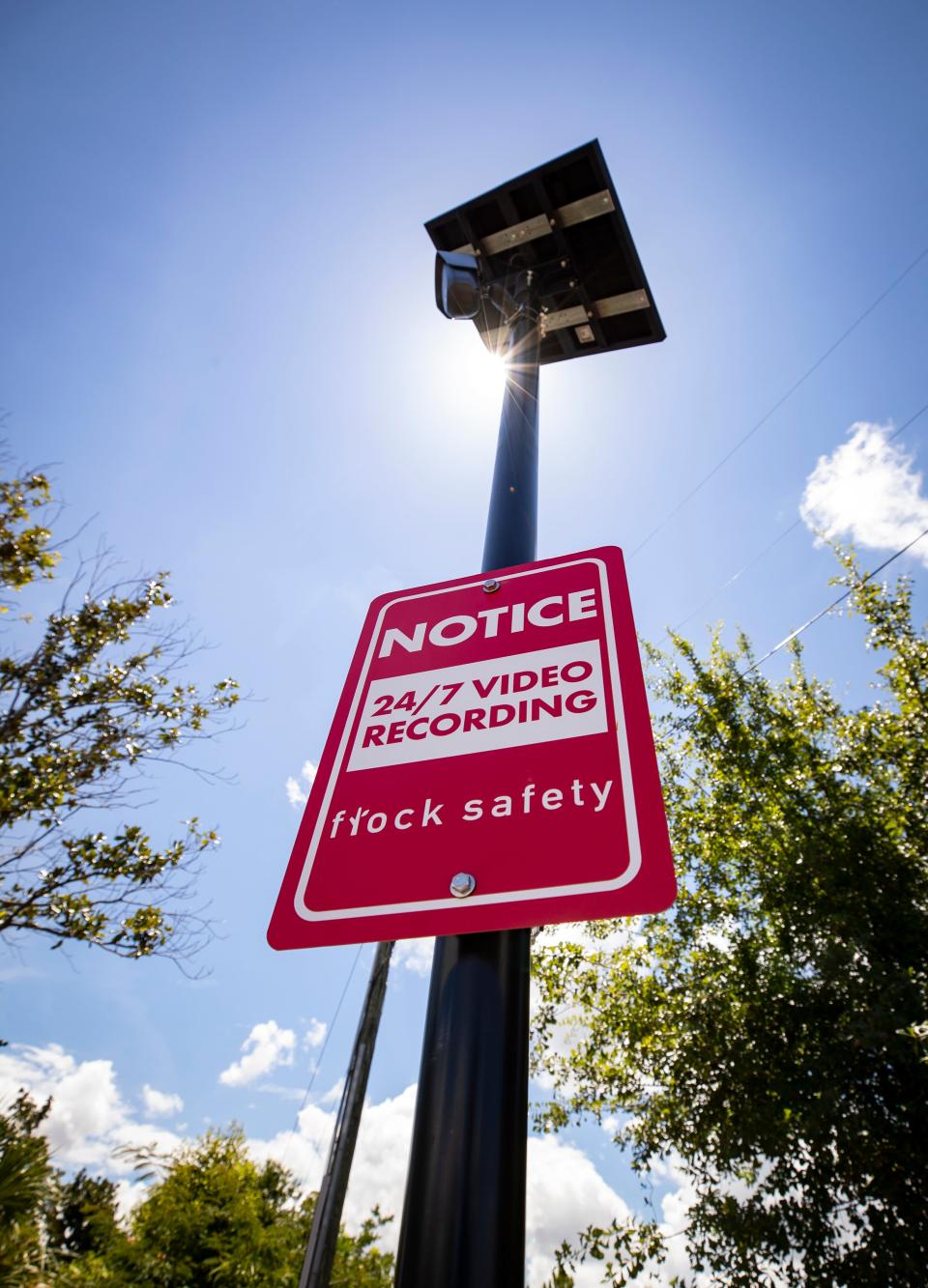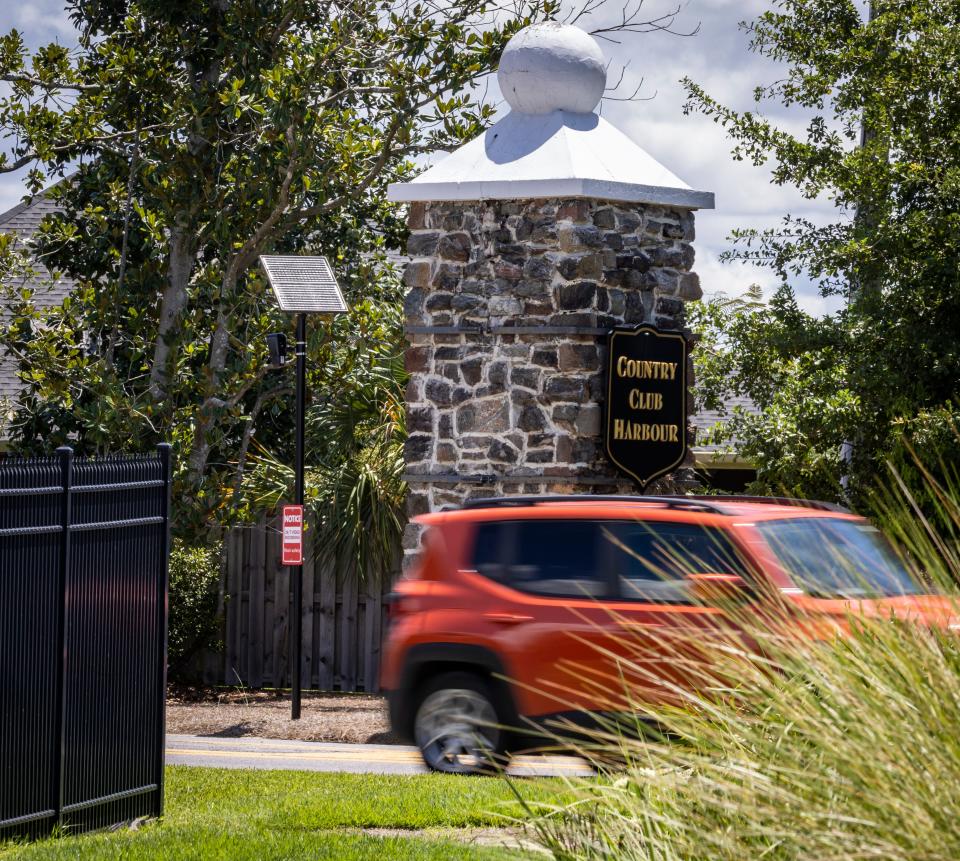Bay HOAs installing license plate readers to prevent crime. Some are raising privacy concerns
LYNN HAVEN — License plate readers are typically used by police seeking to nab car thieves, recover missing persons and even track crimes in progress.
Now, local homeowners associations are getting in on the action. And some organizations, including the American Civil Liberties Union of Florida, are crying foul over privacy concerns.
Bill Bryan, a member of the Country Club Harbour HOA and its security committee, said the association installed two automated license plate readers in February — one at the entrance to Panama Country Club and the other about 100 yards away on Colorado Avenue.

Issues at local condo: Condo owners ask court to halt $80 million HOA construction at Shores of Panama
BCSO's new tech: Bay County project using live cameras to catch crooks deemed a 'game changer' by Sheriff Tommy Ford
The HOA in the community featuring 308 properties became the first in Bay County to install plate readers, according to Bryan and police officials.
"We would love to have a camera on every street in the city. But it's not financially feasible," said Lt. Charles Enfinger of the Lynn Haven Police Department.
But the Country Club Harbour HOA is helping and is supplying police with the necessary information to address and prevent crime.
Enfinger explained how the readers help: A license plate reader, or ALPR, features high-speed cameras that, typically installed on police cruisers or posts alongside the highway, snap photos of passing vehicles, run license plates through the Florida Department of Law Enforcement "hot list" database and, in less than two minutes, send alerts to all area police cruiser computers — not just Lynn Haven's.
The generated information is ultimately entered into a searchable database for all law enforcement agencies. Using it, officers can identify stolen cars, stolen or expired license plates and vehicles marked for a connection to a wanted or missing endangered person, such as someone sought after an Amber Alert is issued.
Sheriff Tommy Ford said the county has 75 license plate readers.
The six cameras Lynn Haven obtained about three years ago have permanent homes atop small poles along three heavily traveled state highways — 389, 390 and 77. Police Chief Ricky Ramie said the annual cost of each plate reader is about $2,500.
"We get a lot of (suspects with) suspended driver's licenses off these things," Enfinger said.
He said the picture quality and information gleaned from the readers help officers with specifics.
For example, if the driver of a red pickup truck is seen breaking into cars, investigators can check license plate readers in the area around the time of the break-ins and look for a red pickup truck, he said.
His officers conduct about three or four arrests and/or write citations daily via the use of the readers, he said.
"We also use them as an investigative tool. We've recovered a lot of stolen vehicles with these LPRs. With the tag readers, we recovered someone's vehicle before it's damaged and with the suspect (still behind the wheel)," he said.
Communities seeking to keep criminals at bay
Bryan said that while his community's HOA has long had surveillance cameras, "what really attracted us to the readers was the ability to flag a stolen vehicle, a vehicle from an Amber Alert or any type of vehicle that (police) had a warrant for."
The HOA's readers are "self-powered" with solar panels that charge the battery packs. The data they collect is "transmitted to the cloud" to which the HOA and police have access, Bryan said. Passing vehicles, bicycles and even golf carts are all recorded with the footage directly available to the HOA and to law enforcement, and it's already triggered several alerts to police. (No statistics were readily available.)

Bryan said the readers also have proven cost effective for the HOA, which formerly budgeted $10,000 annually for extra police patrols.
The HOAs readers, which each cost about $2,000 a year, store information indefinitely.
Reason for concern
That kind of time frame is a sticking point for Ellyne Fields, president of the HOA for The Hammocks Residential Community of Lynn Haven.
Her HOA, which boasts a community of 457 homes, is in the process of purchasing a "tag reader," and hopes to purchase a second one next year. Fields said the association recently installed internet with Wi-Fi at the spot they plan to install the first reader later this week.
But she is uncomfortable with sharing the information directly with law enforcement.
"I want to respect the privacy of people who are innocent," she said. Fields is concerned about taking random license plates and information and using it to track people who have committed no crime.
Fields said she was reassured by Lynn Haven Police Department's 30-day purge policy. Still, her HOA purchased a smaller reader that gives the HOA control about who has access.
The police would need to ask the HOA for access to anything specific, she said.
Enfinger said the police department does not have such a policy because the department cannot control the database. Officers can only conduct searches and gather information from it.
Privacy issues
Florida Department of Law Enforcement guidelines call for searches to be "conducted only by authorized persons in furtherance of an active investigation with the safeguarding of individuals' privacy being of paramount concern," and for the stored data to be purged "to mitigate any potential misuse and improper disclosure of such data."
But some groups believe that, regardless of the guidelines, license plate readers amount to an invasion of an individual's privacy.
"The growth of license plate readers is creating a world where nobody can go anywhere without being tracked," the American Civil Liberties Union of Florida said in a statement. "The tracking of people’s location constitutes a significant invasion of privacy, which can reveal many things about their lives, such as what friends, doctors, protests, meetings, political activities, or religious institutions they visit."
The organization recommends that buyers beware.
"Members of homeowners associations and other private parties should think twice about contributing to a nationwide surveillance system that can be abused in so many ways — including by their own neighbors," the ACLU statement said.
The Electronic Frontier Foundation, a nonprofit that "defends civil liberties in a digital world," called license plate readers "dangerous technology."
"Location-based information collected over time can reveal intimate details of a person’s life, such as where they work and live, where they pray, where they seek medical treatment, and who their friends or romantic partners are," according to the website.
This article originally appeared on The News Herald: Bay County HOAs install license plate readers to help fight crime
